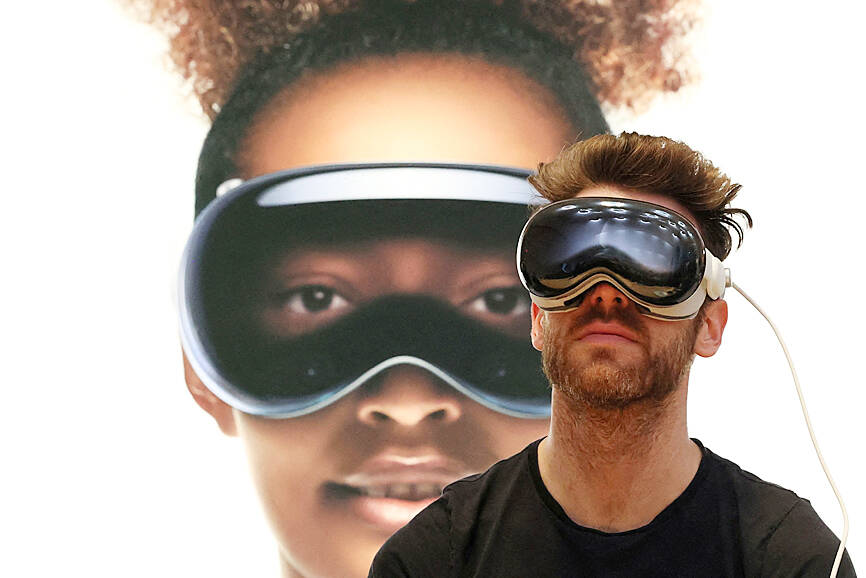Apple Inc’s limited release of the Vision Pro headset is fostering a resale market that is pricing the device far beyond its US$3,500 starting price.
On Japan’s Mercari marketplace, the base 256GB model sold for ¥800,000 (US$5,376), sellers on China’s Taobao (淘寶) are asking 36,000 yuan (US$5,017) and there is one seller on Singapore’s Lazada seeking S$8,500 (US$6,318) for the device.
In Hong Kong’s bustling Mong Kok, an electronics importer specializing in getting gadgets early asks for HK$35,800 (US$4,578), with the price shifting on a daily basis. His advice: best to wait.

Photo: REUTERS
Cupertino, California-based Apple put the Vision Pro on sale in a limited number of stores in the US at the start of this month, with an elaborate setup and customization process for each buyer. The company wants to ensure an optimal first experience with its virtual reality goggles — which it dubs a spatial computer, owing to the hand gestures used to control it.
Questions remain about how big the consumer market is for so-called extended reality (XR) devices, and especially ones with a price like the Vision Pro’s. However, the gadget’s early exclusivity is pushing prices up.
“Our observations indicate inflated prices on unofficial channels, reaching up to 40,000 yuan for Vision Pro units,” Counterpoint Research analyst Ivan Lam (林科宇) said. “However, these purchases likely represent a limited supply, originating from outside markets and deviating from typical consumer behavior.”
The drive to acquire an early unit of the new device comes from various sources, International Data Corp analyst Bryan Ma (馬伯遠) said.
Beyond dedicated Apple fans, overseas software developers as well as industry players and rivals would want to get hands-on experience quickly to figure out their next steps, Ma added.

MULTIFACETED: A task force has analyzed possible scenarios and created responses to assist domestic industries in dealing with US tariffs, the economics minister said The Executive Yuan is tomorrow to announce countermeasures to US President Donald Trump’s planned reciprocal tariffs, although the details of the plan would not be made public until Monday next week, Minister of Economic Affairs J.W. Kuo (郭智輝) said yesterday. The Cabinet established an economic and trade task force in November last year to deal with US trade and tariff related issues, Kuo told reporters outside the legislature in Taipei. The task force has been analyzing and evaluating all kinds of scenarios to identify suitable responses and determine how best to assist domestic industries in managing the effects of Trump’s tariffs, he

TIGHT-LIPPED: UMC said it had no merger plans at the moment, after Nikkei Asia reported that the firm and GlobalFoundries were considering restarting merger talks United Microelectronics Corp (UMC, 聯電), the world’s No. 4 contract chipmaker, yesterday launched a new US$5 billion 12-inch chip factory in Singapore as part of its latest effort to diversify its manufacturing footprint amid growing geopolitical risks. The new factory, adjacent to UMC’s existing Singapore fab in the Pasir Res Wafer Fab Park, is scheduled to enter volume production next year, utilizing mature 22-nanometer and 28-nanometer process technologies, UMC said in a statement. The company plans to invest US$5 billion during the first phase of the new fab, which would have an installed capacity of 30,000 12-inch wafers per month, it said. The

Taiwan’s official purchasing managers’ index (PMI) last month rose 0.2 percentage points to 54.2, in a second consecutive month of expansion, thanks to front-loading demand intended to avoid potential US tariff hikes, the Chung-Hua Institution for Economic Research (CIER, 中華經濟研究院) said yesterday. While short-term demand appeared robust, uncertainties rose due to US President Donald Trump’s unpredictable trade policy, CIER president Lien Hsien-ming (連賢明) told a news conference in Taipei. Taiwan’s economy this year would be characterized by high-level fluctuations and the volatility would be wilder than most expect, Lien said Demand for electronics, particularly semiconductors, continues to benefit from US technology giants’ effort

‘SWASTICAR’: Tesla CEO Elon Musk’s close association with Donald Trump has prompted opponents to brand him a ‘Nazi’ and resulted in a dramatic drop in sales Demonstrators descended on Tesla Inc dealerships across the US, and in Europe and Canada on Saturday to protest company chief Elon Musk, who has amassed extraordinary power as a top adviser to US President Donald Trump. Waving signs with messages such as “Musk is stealing our money” and “Reclaim our country,” the protests largely took place peacefully following fiery episodes of vandalism on Tesla vehicles, dealerships and other facilities in recent weeks that US officials have denounced as terrorism. Hundreds rallied on Saturday outside the Tesla dealership in Manhattan. Some blasted Musk, the world’s richest man, while others demanded the shuttering of his